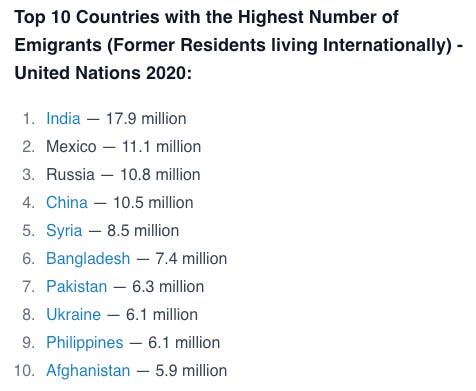Chinese Are Moving 'A Lot Of' Money Out of China, Really?
We frequently come across reports about substantial capital outflows from China. Here are a few recent headlines:
Now, let's provide some context and assess whether this trend warrants genuine concern.
#1 China is a big country with the second largest population
With a substantial population, even a relatively small percentage of emigrants can appear as a significant figure. To illustrate, when examining the top 10 countries with the highest number of emigrants in 2020, China occupies the fourth position. Remarkably, it does not claim the top spot, which is held by India. However, it's worth noting that emerging countries with huge populations tend to lead in these statistics, underscoring my point.
In 2020, China's population stood at 1,411 million, and the emigrant count was 10.5 million, equating to 0.7% of the population. In comparison, India, Russia, and Mexico saw 1.3%, 7.5%, and 8.8% of their populations emigrate in 2020, respectively. These percentages are all higher than China's, yet there is noticeably less media coverage regarding emigration in these countries compared to China.
#2 Despite the exodus of millionaires, the number of millionaires in China continue to increase
Some have argued that it's the wealth itself that is being transferred. The same principle applies here: nations with larger populations often have bigger economies and greater household wealth. Even a small percentage can translate into billions of dollars leaving the country.
According to migration consultancy Henley & Partners, approximately 10,800 high-net-worth individuals in China, each with an average wealth of $6 million, chose to relocate. This would amount to a total of roughly $65 billion.
While this figure may seem substantial, it represents just a tiny fraction, approximately 0.08%, of China's overall household wealth, which stood at $85.1 trillion in 2022. The majority of wealth remains within China.
In fact, the number of millionaires in China has continued to grow despite the emigration of wealthy individuals.
#3 There is always a group of people who are unhappy with the establishment
In every corner of the world, there isn't a single nation where every citizen finds themselves content with their government. It's a universal reality that the world isn't perfectly just, and it's impossible to satisfy everyone.
In instances where a country grapples with a substantial wealth gap between its citizens, some individuals will bemoan the excessive affluence of the wealthy or criticize the government for perceived unfairness or even accuse it of corruption.
When efforts to curb corruption are enacted, others may accuse the government of employing overly harsh and authoritarian measures to take away private wealth.
Essentially, there's always something to voice grievances about.
Therefore, it's entirely reasonable that some individuals have made the decision to pack their belongings and seek residence in another country.
Biased and Selective Reporting
So, what is the underlying motive behind reporting on the outflow of wealth from China?
It appears to be a product of media bias aimed at portraying China in a negative light. This approach serves to reinforce preconceptions of China as a communist, authoritarian regime with stringent capital controls (yet the Chinese were still allowed to emigrate alongside with their wealth.)
By illustrating the departure of a significant number of Chinese citizens as an indicator of the country's unwelcoming environment for the affluent, it contributes to creating a foreboding image of an authoritarian state seizing the assets of its wealthy populace.
In essence, all these components converge to sensationalize and magnify a particular portrayal of China. From our perspective, it amounts to nothing more than biased and selective reporting.




